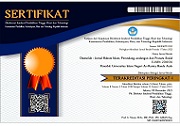CITATIONS
UMROH AS THE REASON FOR UNILATERAL TERMINATION OF EMPLOYMENT BY PT. DARUSSALAM BERLIAN MOTOR FROM THE PERSPECTIVE OF IJĀRAH BI AL-‘AMAL (Verdict Case Study No. 1/Pdt.Sus-PHI/2019/PN Bna)
Abstract
PT. Darussalam Berlian Motor has terminated one of its employees on the grounds of performing the umroh. However the company/defendant argued that the employee/litigant had left their job without even notifying the defendant in advance. The defendat also explained that during their tenure, the litigant often made serious mistakes. On contrary, due to the serious mistakes that had been committed before, the defendant did not terminate the employment contract and the action was only taken when the litigant performed umroh in the holy land. The question in this research is how the judge considers the unilateral termination of employment experienced by the employee and what are the factors that cause the judge to grant the litigant’s claim. And how is the perspective of Ijārah bi al-‘Amal contract against the judge’s decision regardimg the grant of the litigant’s claim. In this research the authors used normative legal research method that analyzed the judge’s decree No. 1/Pdt.Sus-PHI/2019/PN Bna with qualitative approach. The judge in his decree considered thet the termination of employment on the grounds that the litigant had committed serious problems could not be considered because it was not in accordance with the applicable law. As for the factors that caused the judge to grant the litigant’s claim, due to the absence of evidence of a second PKWT contract between the litigant and the defendant, that’s why the previously PKWT contract changed to PKWTT contract. In Islamic law, when ones terminating a work relationship a company can perform fasakh through urbun which has similarities with the obligation to pay severance pay. From the explanation above, it can be concluded that unilateral termination of employment cannot be justified and does not have a string legal force.
Keywords
Umrah, Pemutusan Hubungan Kerja Sepihak, Ijārah bi al-‘Amal
Full Text:
PDFReferences
Republik Indonesia. Undang-Undang Nomor 13 Tahun 2003. Lembaran Negara Tahun 2003 No. 39. Tambahan Lembaran Negara No. 4279. 2003
Willy Farianto. “Penerapan PHK karena Kesalahan Berat Pasca Putusan MK". Diakses melalui situs https://m.hukumonline.com/berita/baca/lt4fde49d6569fc/penerapan-phk-karena-kesalahan-berat-pasca-putusan-mk-broleh-willy-farianto-/. Pada tanggal 2 Juli 2020.
Imam Soepomo. Pengantar Hukum Perburuhan. Jakarta: Djambatan. 2003.
Yosef. Tesis: “Perlindungan Hukum Pemutusan Hubungan Kerja karena Kesalahan Berat Studi Kasus terhadap Surat Keputusan Direksi PT. Taspen (Persero)”. Jakarta: Universitas Indonesia. 2008.
Abdul Hadi. “Perlindungan Hukum terhadap Karyawan yang Mengalami Pemutusan Hubungan Kerja Setelah Putusan Pengadilan Berkekuatan Hukum Tetap”. Jurnal Surya Kencana Satu: Dinamika Masalah Hukum dan Keadilan. Vol. 10. No. 2. 2018.
Afrianto Budi. “Perlindungan Hukum bagi Pekerja yang di-PHK". Diakses melalui situs https//www.akademiasuransi.org/2012/10/perlindungan-hukum-bagi-pekerja-yang-di-.html?m=1. Pada tanggal 6 Juli 2020.
Eko Prasetyo. Upah dan Pekerja. Yogyakarta: Resist Book. 2006.
Narun Haroen. Fiqh Muamalah. Jakarta: Gaya Media Pratama. 2007.
Al-Khathib, Syarbini. Mughniy Muhtaj, jilid II. Beirut: Dar Al-Fikr. 1978.
Nur Iftitah Isnantiana. “Legal Reasoning Hakim Dalam Pengambilan Putusan Perkara Di Pengadilan”. Jurnal Pemikiran Islam. Vol. XVIII. No. 2. 2017
Mukti Arto. Praktek Perkara Perdata Pada Pengadilan Agama. cet V. Yogyakarta: Pustaka Pelajar. 2004.
M. Yahya Harahap. Hukum Acara Perdata. Jakarta: Sinar Grafika. 2008.
Pengadilan Negeri Kelas IA Banda Aceh. “Putusan Nomor 1/Pdt.Sus-PHI/2019/Pn Bna”. 2019.
Zuhaili, Wahbah. Fiqih Islam wa Adillatuh, jilid V. Jakarta: Gema Insani. 2011.
Hendi Suhendi. Fiqh Muamalah. Jakarta: RajaGrafindo Persada. 2002
Al-‘Asqalany, Ibnu Hajar. Buluqhul Maram Min Adillatil Ahkam, terj. Lutfi Arif dkk. Buluqhul Maram Five in One, cet. I. Jakarta: Noura Books. 2008.
Sabiq, Sayyid. Fiqh Sunnah, terj. Nor Hasanuddin. Jakarta: Pena Pundi Aksara. 2006.
Republik Indonesia. Keputusan Menteri tentang Ketentuan Pelaksanaan Perjanjian Kerja Waktu Tertentu No. KEP.100/MEN/VI/2004. 2004.
Republik Indonesia. Undang-Undang Nomormor 2 Tahun 2004. Lembarang Negara Tahun 2004 No. 6. Tambahan Lembaran Negara No. 4356. 2004.
Republik Indonesia. Mahkamah Konstitusi No. 012/PUU-I/2003 Tentang Pengujian UU No. 13 Tahun 2003 Terhadap UUD 1945. 2003.
Yusuf al-Qardhawi. Peran Nilai dan Moral Ekonomi Islam. Terj. oleh Didin Hafiduddin. Jakarta: Rajawali Press. 1997.
Departemen Agama RI. Al-quran dan Terjemahnya. Bandung: CV. Penerbit Jumanatul ‘Ali-Art, 2005.
Zaeni Asyhadie. Hukum Kerja. Jakarta: PT. RajaGrafindo Persada. 2007.
Abu Husin Muslim bin Hajjaj. Shahih Muslim. jilid I. Beirut: Dar al Fikr. 1971.
DOI: http://dx.doi.org/10.22373/dusturiyah.v11i1.8430
Refbacks
- There are currently no refbacks.
Copyright (c) 2021 Siti Azizah, Husni Mubarrak, Muslem Muslem
Indexed by:
Tools:
All papers published in Dusturiyah: Jurnal Hukum Islam, Perundang-undangan dan Pranata Sosial are licensed under a Creative Commons Attribution-ShareAlike 4.0 International License. |
Office address: Fakultas Syariah dan Hukum Universitas Islam Negeri Ar-Raniry. Jl. Ar-Raniry, Kopelma Darussalam, Syiah Kuala, Banda Aceh, Aceh, Indonesia 23111. Email: jurnal.dusturiyah@ar-raniry.ac.id
situs toto slot gacor slot gacor situs toto















